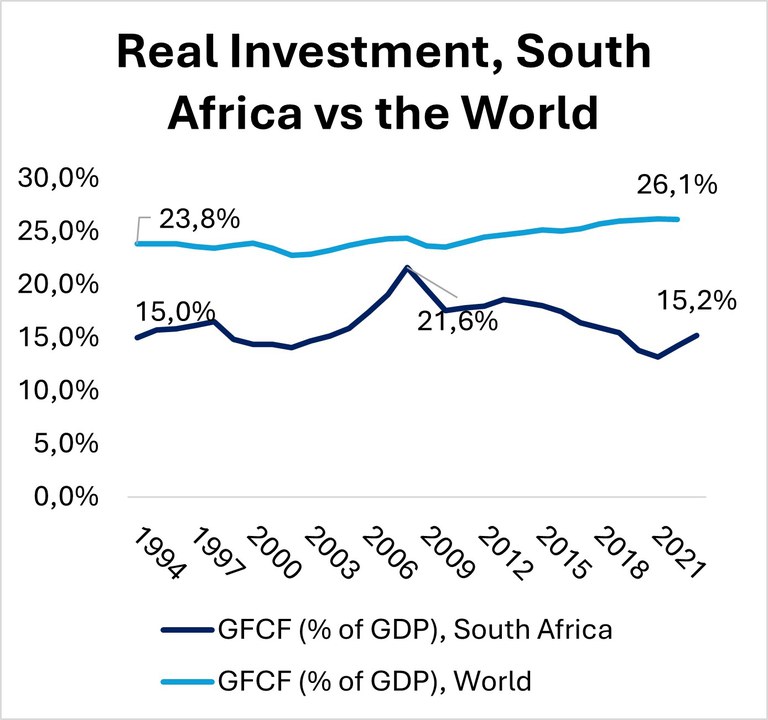
In his latest Letter from the Desk of the President, Cyril Ramaphosa correctly observed that (real) transformation and economic growth are not mutually exclusive. Rather, they are mutually reinforcing.
However, when Ramaphosa promised, yet again, “to ensure that we pursue both growth and transformation”, he made it clear that he meant to ensure more fake transformation, not real transformation.
Real life transformation happens when opportunities expand to include more South Africans through education, on-the-job upskilling, and real improvement of income, wealth, and living standards. This only happens sustainably when the economy grows in real terms per person, which it has not done since 2007.
Fake transformation, by contrast, happens when positions are taken away from one person and given to another, or else simply annihilated.
The President pushes further down the pitted road of the latter fake transformation on five axes – role modelling, transparency, value for money, investment, and employment.
Role Modelling
Critics of fake transformation are wide-ranging. Any credible review of anti-BEE criticism in the news media is bound to include very prominent black, coloured, and Indian public figures.
In this context, any role model of non-racialism will mainly focus on BEE arguments by looking at the merits of the arguments, regardless of who advances them.
However, Ramaphosa did the opposite. Rather, he clearly ignored all black critics of BEE, and implicitly dismissed older white critics, by writing that “many who continue to benefit from the legacy of exclusion continue to decry black economic empowerment”.
Hiding legitimate criticisms of BEE behind this kind of rhetoric keeps fake transformation in place and keeps real transformation at bay.
Transparency
How much does BEE cost? Despite repeated requests from IRR Legal, the Treasury continues to fail to meet the constitutional requirement of transparently reporting the cost of BEE premiums in the R1.1 trillion procurement budget.
Fake transformation is always non-transparent, because that is how people make fake things look real. Unfortunately, Ramaphosa has done nothing to improve transparency on BEE premiums.
Furthermore, since most tax is now paid by black people, it is noteworthy that the current fake transformation system redistributes a hidden amount of BEE premiums from the general population to a connected few.
Value for money
There is an estimated national shortage of 80,000 classrooms in the midst of a budget crisis. The current fake transformation system driven by Ramaphosa allows contractors to charge 25% extra, based on race, to build a new classroom.
However, rather than leave it at that, the Public Procurement Act removes the 25% cap, so that BEE premiums can legally go even higher. Ramaphosa signalled enthusiasm for enforcing that Act in his latest letter, which will ramp up fake transformation.
By contrast, the Zondo Report called for “maximum value-for-money” in the public procurement system. That would be real transformation.
In a recent IRR poll, most respondents, and more than three quarters of black respondents specifically, preferred a maximum value-for-money approach to the payment of BEE premiums in government tenders.
Investment
The World Bank, IMF, and Harvard Growth Lab have all pointed to BEE as an obstacle to investment, both local and international. Comparing “Gross Fixed Capital Formation” (GFCF) in South Africa versus the rest of the world since 1994 exposes the decline in investment over the last two decades.

Real transformation takes real investment, which will increase if BEE barriers to investment are removed. Currently, South Africa is getting half as much real investment as the ANC’s own development plan requires. Unfortunately, Ramaphosa committed to chase away more investment by doubling down on BEE.
Employment
Black unemployment has more than doubled during the “transformation” era that Ramaphosa focused on. In 2007 there were roughly 5.5 million unemployed black people, which has risen to over 11.5 million at the latest count.
The Employment Equity Act that Ramaphosa championed has already been used explicitly to block the hiring of black, coloured, Indian, and white women, and men of all races, in the civil service, on the basis of race. Now, under Ramaphosa’s direction, racial moratoriums are being brought to the private sector too. That is fake transformation, bound to increase black unemployment even further.
Real transformation, by contrast, means bringing down unemployment through non-racial reasoning, transparency, maximum value-for-money procurement, boosted investment, and a liberalised labour market.
Former Public Protector Thuli Madonsela perhaps most viscerally summarised the problem with the kind fake transformation that Ramaphosa is pushing under current BEE legislation when she observed: “We need to rethink BEE because with BEE you are feeding the fat cow and then saying it must poop so that the others can get something. That is just not a good formula.”
Media contact: Gabriel Crouse, IRR Legal executive director Tel: 082 510 0360 Email: gabriel@irrlegal.org.za
Media enquiries: Michael Morris Tel: 066 302 1968 Email: michael@irr.org.za
 IRR webinar alert: Cut VAT & BEE premiums in 2026 Budget
Feb 13, 2026
IRR webinar alert: Cut VAT & BEE premiums in 2026 Budget
Feb 13, 2026
 IRR arms MPs with questions for Ramaphosa ahead of SONA debate
Feb 12, 2026
IRR arms MPs with questions for Ramaphosa ahead of SONA debate
Feb 12, 2026
 Mr President, don’t miss your value-for-money moment – IRR
Feb 11, 2026
Mr President, don’t miss your value-for-money moment – IRR
Feb 11, 2026
 Much more needed to secure SA’s economic turnaround – IRR
Feb 10, 2026
Much more needed to secure SA’s economic turnaround – IRR
Feb 10, 2026
 FMD crisis: How did we get to this point? — Terence Corrigan - Biznews
Feb 09, 2026
FMD crisis: How did we get to this point? — Terence Corrigan - Biznews
Feb 09, 2026

 IRR webinar alert: Cut VAT & BEE premiums in 2026 Budget
Feb 13, 2026
IRR webinar alert: Cut VAT & BEE premiums in 2026 Budget
Feb 13, 2026
 IRR arms MPs with questions for Ramaphosa ahead of SONA debate
Feb 12, 2026
IRR arms MPs with questions for Ramaphosa ahead of SONA debate
Feb 12, 2026
 Mr President, don’t miss your value-for-money moment – IRR
Feb 11, 2026
Mr President, don’t miss your value-for-money moment – IRR
Feb 11, 2026
 Much more needed to secure SA’s economic turnaround – IRR
Feb 10, 2026
Much more needed to secure SA’s economic turnaround – IRR
Feb 10, 2026
 FMD crisis: How did we get to this point? — Terence Corrigan - Biznews
Feb 09, 2026
FMD crisis: How did we get to this point? — Terence Corrigan - Biznews
Feb 09, 2026